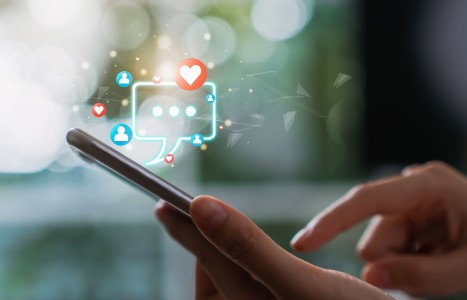Think of your most difficult patient – the one you try to motivate and work so hard with to develop a realistic treatment plan with achievable and measurable goals. Week after week, you see this patient struggle, sinking deeper into hopelessness as their health and quality of life continue to worsen. What if there was something else you could do that could change their outlook and their life? The solution is as simple as an automated program.
| Digital ExclusiveHard Work Through Commitment and Action Creates Friendships
The thought and title for this article came courtesy of Charlie Xiu, of RMIT University in Melbourne, Australia. Dr. Xiu, a practitioner of Oriental medicine, relocated from Canton, China, to head the department of Oriental medicine and conduct research at RMIT Australia. He serves as a delegate to the informal consultation meetings for the international classification of East Asian traditional medicine. After three days of intense discussions about this medicine and how to classify and codify it for inclusion in the world's health care system, he shared how this process of inclusion and classification has built strong and respectful friendships. This entire concept resonated with me because it is what we must pursue in the United States.
In recent years, we have become so familiar with using technology and sending e-mails to one and all that we have forgotten to do what was perhaps explained best by the familiar slogan of AT&T: "Reach Out and Touch Someone." Personal notes, letters and even phone calls seem to be becoming things of the past.
We start and end our days by using our personal computers and, yes, even our phones can send e-mail for us. We never have to speak to or contact someone except with some form of electronic transmission. Every morning (at least on weekdays) begins very early by catching up with e-mails. Please don't take this the wrong way. Electronic communication has become an important part of our lives and businesses, but we must not forget the personal touch. Many times, the electronic transmission loses its meaning or the message is misunderstood. We also must remember that in a sense, e-mail isn't just "electronic" mail, but also "evidence" mail. So, it is best to write only good and positive information about people and events, and not some of the other stuff that sometimes creeps into our thoughts.
As members of this profession, we must concentrate on understanding the various peoples and cultures represented, so we can appreciate each other and create connections. There are many problems to solve, both within and without, that relate to the profession of Oriental medicine. Technology causes us to interact, but this interaction doesn't help us to understand or appreciate one another.
This profession has to produce results with patients, each other, and with the political forces statewide and on the national level. As a single practitioner, you can only do so much by yourself. However, by deciding to network with others in this profession, much more can be achieved. What is it that shapes each of us and our mindset? There is a place and a job for everyone. Each person has an opinion. These opinions must be respected, discussed and understood by everyone. We can no longer disagree in public and influence policy-makers without endeavoring to reach a consensus with others. There is too much at stake for this profession.
One of the strongest elements of this medicine is that is emits positive hope. This hope is conveyed to patients on a daily basis. This element of hope is supported by research being conducted in countries around the world, as well as in the U.S. It's up to each of us to share this informative hope with everyone we meet and know.
This attitude of respect and friendship was certainly demonstrated at the Southwest Symposium. The event was held in Austin, Texas and sponsored by the Academy of Oriental Medicine at Austin, under the capable and forward-looking leadership of Dr. Will Morris. He has led the American Association of Oriental Medicine, now the AAAOM, over the past two years as it has continued to reach out to all groups in every state. He also played a key role in the eventual merger of the Alliance and the AAOM. This was a monumental achievement of hard work through commitment and action, and it has resulted in numerous new friendships developing. Leslie McGee has picked up the leadership reigns to move this profession ahead. If you do not yet know Leslie, you should. She and the profession need help to continue on the path of growth and maturity.
There still are eight-and-a-half states that do not have licensing to protect acupuncturists in their practices while they treat and help patients. The states not regulated are Alabama, Kansas, Louisiana, Mississippi, North Dakota, Oklahoma, South Dakota and Wyoming. We need the help of the providers in these states to get this job completed. Current and future patients, as well as the practitioners who serve them, will appreciate the effort put forward to achieve this goal. This process will be accomplished by hard work, commitment and action. How many other practitioners do you know in any of these states? What can you do to facilitate the formation of a group to begin the process of achieving regulation? I spoke with George Beltz, an acupuncturist practicing in unregulated Oklahoma. He and many other acupuncturists would like to move the process forward. This will take hard work, commitment and action - but, in turn, many friendships will be established.
Each of us must begin to ask ourselves, When did I last reach out and touch someone in my profession - be it a peer, a classmate or even a former teacher or someone at my school? You are not alone in this profession. This is a rapidly growing profession and you are part of a vital, wanted and needed medicine. In your specific geographic location, there may be many or few other practitioners - just reach out and touch one other person and build a friendship. We are not alone in this journey. We must work with others to achieve the goal of spreading the message about acupuncture to everyone. The National Acupuncture Outreach Project is a campaign referred to on the front of the Acupuncture Answer Book. It reminds us of the responsibility to share the art and science of Oriental medicine by building that special bond through concern for others and friendships.


